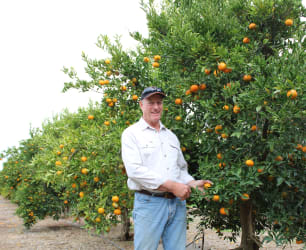Have growers experienced the ‘unicorn’ vintage we’ve heard about recently?
What factors were most important for this quality of vintage?
Growers certainly experienced a very solid vintage with little disease pressure, mild growing conditions and few heat waves.
As reported by Wine Australia the Riverland region crushed 558,252 metric tons, which would be the largest crush in the region on records going back to 1993.
The Riverland is now producing 25 per cent of Australian wine – what is CCW’s reaction to reaching this milestone?
What have been the key factors to the region’s growth in wine exports/quality?
The Riverland holds this position due to its strong value proposition to the market, and being a consistently and reliable producing region, with low disease pressure.
Our wines continue to meet and exceed the expectations of wine drinkers domestically and around the world.
What factors will be vital to ensuring Riverland grape and wine production continues to expand?
With the recent stoppage of export for the most part to China, it will be essential for the region and industry to retain and win market share elsewhere, in particular for red wine.
The ability of the industry to pivot and maintain low production cost will be key to the survival and growth of hectares in the region going forward.
Have stability in water allocations, and cheaper temporary water prices, helped growers this year?
For growers leasing in water this has certainly helped with the cost of production, after a very difficult year last year.
This year we have seen a return to a more normal pricing environment, due to increased rainfall entering catchments in the past 12 months.
What should growers be doing at this time of year to ensure healthy vines?
There are many checks growers should be doing which include inspecting vines for scale, soil sampling and analysis.
If you are a CCW member contact our staff who are more than happy to give advice and help growers get on top of pest and disease issues.





